Your Gastrointestinal stromal tumor survival rate images are ready in this website. Gastrointestinal stromal tumor survival rate are a topic that is being searched for and liked by netizens now. You can Find and Download the Gastrointestinal stromal tumor survival rate files here. Get all royalty-free images.
If you’re looking for gastrointestinal stromal tumor survival rate pictures information connected with to the gastrointestinal stromal tumor survival rate topic, you have visit the right blog. Our website always provides you with suggestions for seeking the maximum quality video and picture content, please kindly search and locate more informative video articles and graphics that match your interests.
Gastrointestinal Stromal Tumor Survival Rate. In this case the ratio seen in 10 fields can be converted to that expected in 50 fields. However survival rates for this type of tumor depend on several factors including specific biologic characteristics of the tumor the type of treatment and the risk that it will come back after treatment. The response rate of imatinib and sunitinib were 733 and 60 respectively. ICCs are sometimes called the pacemakers of the GI tract because they signal the muscles in the GI.
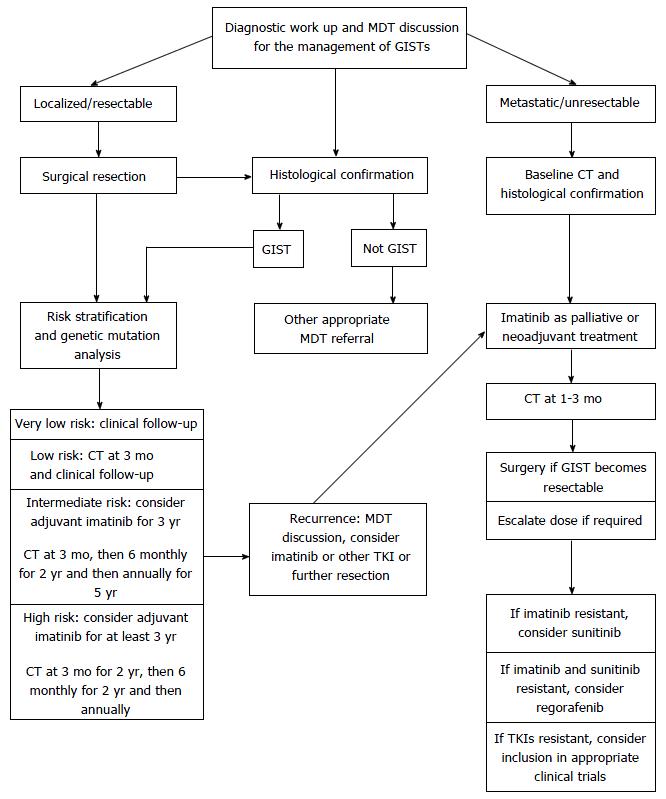 Current Research And Treatment For Gastrointestinal Stromal Tumors From wjgnet.com
Current Research And Treatment For Gastrointestinal Stromal Tumors From wjgnet.com
Gastrointestinal stromal tumors GISTs are soft tissue sarcomas that originate from the interstitial cells of Cajal ICC or from stem cells that can differentiate towards ICCs and can arise anywhere along the gastrointestinal tract GI and elsewhere in the abdomen with a reported incidence of up to 145 per million per year. For example a mitotic count of 1050 HPF would indicate 10 mitoses counted in 50 fields. The 5-year overall survival OS rates in patients with GIST leiomyosarcomas and other sarcomas were 553 484 and 449 respectively and the 10-year OS rates were 525 92 and 230 respectively. Given the tremendous improvements in overall survival and well-tolerated side effects of TKI. The 5-year recurrence-free survival RFS rate was better for GIST 357. ICCs are sometimes called the pacemakers of the GI tract because they signal the muscles in the GI.
Given the tremendous improvements in overall survival and well-tolerated side effects of TKI.
The 5-year recurrence-free survival RFS rate was better for GIST 357. Survival rates The 5-year relative survival rate for a GIST that is localized has not yet spread is up to 93 percent according to the American Cancer Society. We conducted a cohort study where patients with GISTs after another malignancy AM-GISTs n 851 and those with only GISTs GISTs-1 n 7660 were identified from the Surveillance Epidemiology and. Overall survival rates for patients with GISTs were 88 at 1 year 77 at 2 years 67 at 3 years and 51 at 5 years. While its understandable that a GIST patient would want to learn as much as possible about his or her condition including the pertinent survival statistics this information must always be viewed within a proper context. Study shows strong long-term survival rates for patients with GIST.
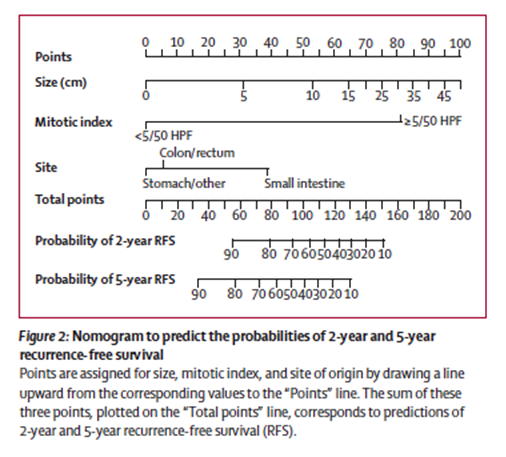 Source: bccancer.bc.ca
Source: bccancer.bc.ca
Gastrointestinal stromal tumors GISTs start in very early forms of special cells in the wall of the GI tract called the interstitial cells of Cajal ICCs. ICCs are sometimes called the pacemakers of the GI tract because they signal the muscles in the GI. Overall survival rates for patients with GISTs were 88 at 1 year 77 at 2 years 67 at 3 years and 51 at 5 years. For example a mitotic count of 1050 HPF would indicate 10 mitoses counted in 50 fields. P 0003 than for leiomyosarcomas 34 and other sarcomas 214.
 Source: ejso.com
Source: ejso.com
Sometimes only 10 fields are counted. If cancerous the tumor may also be called a soft tissue sarcomaSymptoms depend on the. We conducted a cohort study where patients with GISTs after another malignancy AM-GISTs n 851 and those with only GISTs GISTs-1 n 7660 were identified from the Surveillance Epidemiology and. It has been reported that the 5-year overall survival rate of patients treated with postoperative imatinib is 83 to 92 5 6. The response rate of imatinib and sunitinib were 733 and 60 respectively.
 Source: researchgate.net
Source: researchgate.net
The overall survival rate for all 200 patients in this study was 35 at 5 years which is similar to the results of Ng et al who reported 28 survival at 5 years in a group of 191 patients encountered during 30 years. Localized cancer is limited to the organ where it started for example the stomach small intestine or esophagus. If cancerous the tumor may also be called a soft tissue sarcomaSymptoms depend on the. ICCs are sometimes called the pacemakers of the GI tract because they signal the muscles in the GI. While its understandable that a GIST patient would want to learn as much as possible about his or her condition including the pertinent survival statistics this information must always be viewed within a proper context.
 Source: emedicinehealth.com
Source: emedicinehealth.com
Study shows strong long-term survival rates for patients with GIST. Study shows strong long-term survival rates for patients with GIST. Gastrointestinal stromal tumors GISTs are soft tissue sarcomas that originate from the interstitial cells of Cajal ICC or from stem cells that can differentiate towards ICCs and can arise anywhere along the gastrointestinal tract GI and elsewhere in the abdomen with a reported incidence of up to 145 per million per year. The 1-year and 5-year disease-free survival rates were 85 and 667 respectively while the 1-year and 5-year overall survival rates were 985 and 866 respectively. For example 110 HPF would be equivalent to 550 HPF.
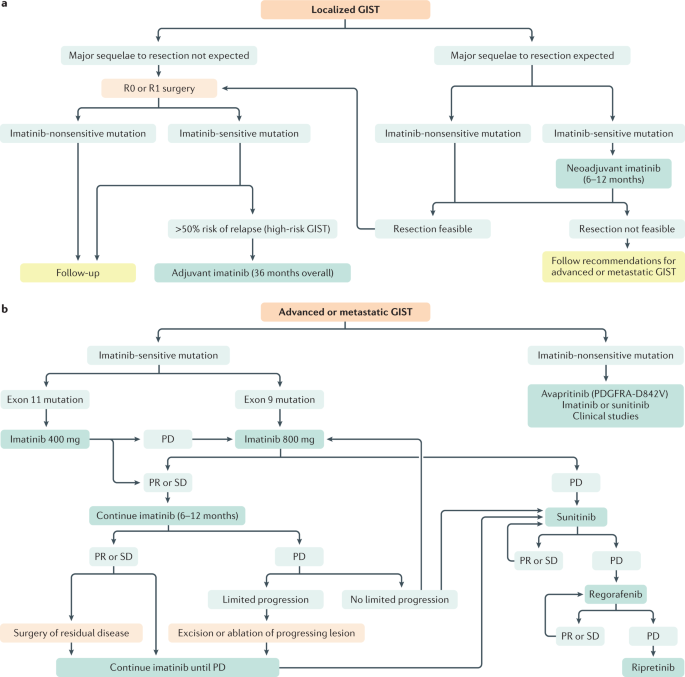 Source: nature.com
Source: nature.com
If cancerous the tumor may also be called a soft tissue sarcomaSymptoms depend on the. While its understandable that a GIST patient would want to learn as much as possible about his or her condition including the pertinent survival statistics this information must always be viewed within a proper context. Complete surgical resection and postoperative adjuvant therapy with imatinib are still the only treatments for GIST patients. Study shows strong long-term survival rates for patients with GIST. Gastrointestinal stromal tumors have a high survival rate if the cancer is caught early.
 Source: ejcancer.com
Source: ejcancer.com
94 of people diagnosed with localized GI stromal tumors are alive five years later. Gastrointestinal stromal tumors GISTs are soft tissue sarcomas that originate from the interstitial cells of Cajal ICC or from stem cells that can differentiate towards ICCs and can arise anywhere along the gastrointestinal tract GI and elsewhere in the abdomen with a reported incidence of up to 145 per million per year. The 5-year recurrence-free survival RFS rate was better for GIST 357. Sometimes only 10 fields are counted. The GIST survival rate may be on the mind of a patient who has been diagnosed with a gastrointestinal stromal tumor GIST.
 Source: researchgate.net
Source: researchgate.net
To explore overall survival OS and GISTs-specific survival GSS among cancer survivors developing a second primary gastrointestinal stromal tumors GISTs. Gastrointestinal stromal tumors GISTs are soft tissue sarcomas that originate from the interstitial cells of Cajal ICC or from stem cells that can differentiate towards ICCs and can arise anywhere along the gastrointestinal tract GI and elsewhere in the abdomen with a reported incidence of up to 145 per million per year. Gastrointestinal stromal tumor GIST is a rare tumor accounting for less than 1 of primary gastrointestinal GI neoplasms. The response rate of imatinib and sunitinib were 733 and 60 respectively. Reduces rates of recurrence by 65 and an increased 5 year overall survival from 82 to 92 1213.
 Source: researchgate.net
Source: researchgate.net
However survival rates for this type of tumor depend on several factors including specific biologic characteristics of the tumor the type of treatment and the risk that it will come back after treatment. Overall survival rates for patients with GISTs were 88 at 1 year 77 at 2 years 67 at 3 years and 51 at 5 years. If cancerous the tumor may also be called a soft tissue sarcomaSymptoms depend on the. Gastrointestinal stromal tumor GIST is a rare tumor accounting for less than 1 of primary gastrointestinal GI neoplasms. While its understandable that a GIST patient would want to learn as much as possible about his or her condition including the pertinent survival statistics this information must always be viewed within a proper context.
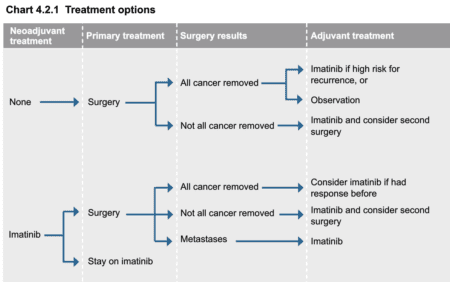 Source: liferaftgroup.org
Source: liferaftgroup.org
ICCs are sometimes called the pacemakers of the GI tract because they signal the muscles in the GI. The 5-year survival rate for people with a GIST is 83. ICCs are sometimes called the pacemakers of the GI tract because they signal the muscles in the GI. The overall survival rate for all 200 patients in this study was 35 at 5 years which is similar to the results of Ng et al who reported 28 survival at 5 years in a group of 191 patients encountered during 30 years. GASTROINTESTINAL STROMAL TUMOR Union for International Cancer Control 2014 Review of Cancer Medicines on the WHO List of Essential Medicines.
 Source: wjgnet.com
Source: wjgnet.com
The response rate of imatinib and sunitinib were 733 and 60 respectively. Gastrointestinal stromal tumors GISTs start in very early forms of special cells in the wall of the GI tract called the interstitial cells of Cajal ICCs. P 0003 than for leiomyosarcomas 34 and other sarcomas 214. Sometimes only 10 fields are counted. There were 19 patients with recurrent disease and 6 patients died of intestinal GISTs.
 Source: annalsofoncology.org
Source: annalsofoncology.org
The overall survival rate for all 200 patients in this study was 35 at 5 years which is similar to the results of Ng et al who reported 28 survival at 5 years in a group of 191 patients encountered during 30 years. Life expectancy for gastrointestinal stromal tumor GIST is often expressed in 5-year survival rates that is how many people will be alive 5 years after diagnosis. However survival rates for this type of tumor depend on several factors including specific biologic characteristics of the tumor the type of treatment and the risk that it will come back after treatment. Gastrointestinal stromal tumor 5-year survival rates. Study shows strong long-term survival rates for patients with GIST.
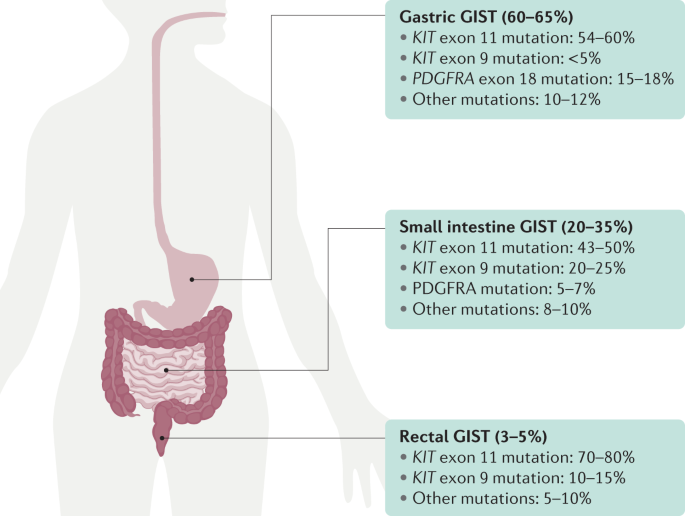 Source: nature.com
Source: nature.com
Nearly one in four patients with incurable gastrointestinal stromal tumors GIST treated with Gleevec will survive 10. Reduces rates of recurrence by 65 and an increased 5 year overall survival from 82 to 92 1213. Gastrointestinal stromal tumors have a high survival rate if the cancer is caught early. The median age of diagnosis is approximately 60 years with the annual incidence estimated at 1020 cases per million Nilsson et al 2005. Sometimes only 10 fields are counted.
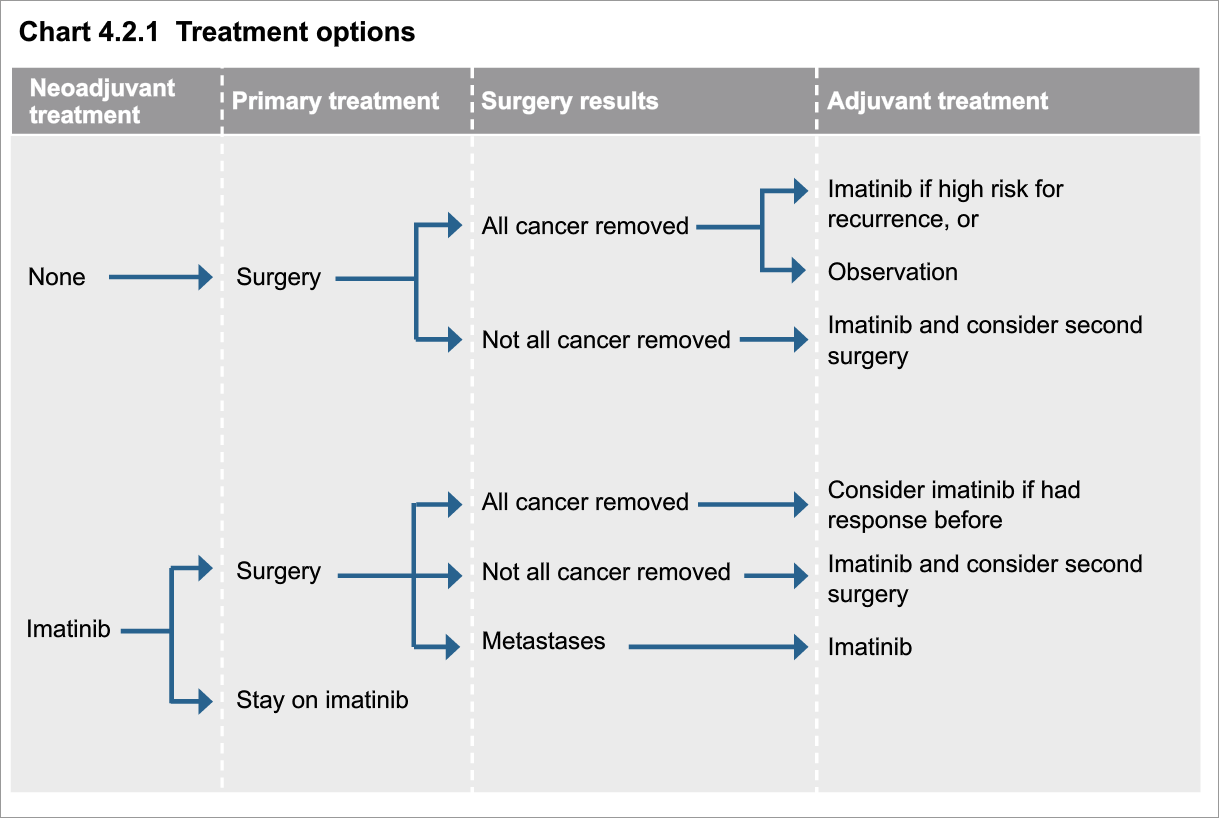 Source: liferaftgroup.org
Source: liferaftgroup.org
Complete surgical resection and postoperative adjuvant therapy with imatinib are still the only treatments for GIST patients. Study shows strong long-term survival rates for patients with GIST. Survival rates The 5-year relative survival rate for a GIST that is localized has not yet spread is up to 93 percent according to the American Cancer Society. The GIST survival rate may be on the mind of a patient who has been diagnosed with a gastrointestinal stromal tumor GIST. The 1-year and 5-year disease-free survival rates were 85 and 667 respectively while the 1-year and 5-year overall survival rates were 985 and 866 respectively.
 Source: ejso.com
Source: ejso.com
It has been reported that the 5-year overall survival rate of patients treated with postoperative imatinib is 83 to 92 5 6. However survival rates for this type of tumor depend on several factors including specific biologic characteristics of the tumor the type of treatment and the risk that it will come back after treatment. To explore overall survival OS and GISTs-specific survival GSS among cancer survivors developing a second primary gastrointestinal stromal tumors GISTs. P 0003 than for leiomyosarcomas 34 and other sarcomas 214. For example 110 HPF would be equivalent to 550 HPF.
Source: encrypted-tbn0.gstatic.com
Sometimes only 10 fields are counted. While its understandable that a GIST patient would want to learn as much as possible about his or her condition including the pertinent survival statistics this information must always be viewed within a proper context. However survival rates for this type of tumor depend on several factors including specific biologic characteristics of the tumor the type of treatment and the risk that it will come back after treatment. What Is the Survival Rate for Gastrointestinal Stromal Tumors. The 5-year overall survival OS rates in patients with GIST leiomyosarcomas and other sarcomas were 553 484 and 449 respectively and the 10-year OS rates were 525 92 and 230 respectively.
 Source: researchgate.net
Source: researchgate.net
GASTROINTESTINAL STROMAL TUMOR Union for International Cancer Control 2014 Review of Cancer Medicines on the WHO List of Essential Medicines. P 0003 than for leiomyosarcomas 34 and other sarcomas 214. There were 19 patients with recurrent disease and 6 patients died of intestinal GISTs. The response rate of imatinib and sunitinib were 733 and 60 respectively. The GIST survival rate may be on the mind of a patient who has been diagnosed with a gastrointestinal stromal tumor GIST.
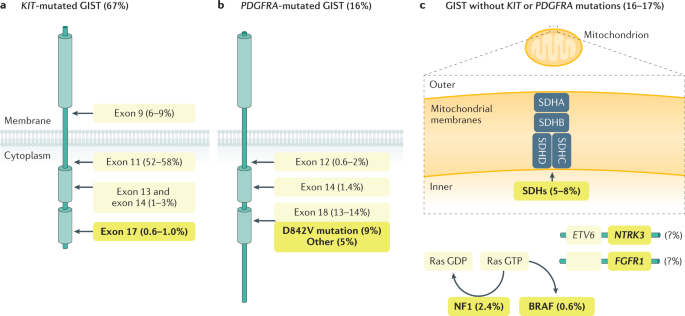 Source: nature.com
Source: nature.com
94 of people diagnosed with localized GI stromal tumors are alive five years later. The GIST survival rate may be on the mind of a patient who has been diagnosed with a gastrointestinal stromal tumor GIST. Gastrointestinal stromal tumor 5-year survival rates. However survival rates for this type of tumor depend on several factors including specific biologic characteristics of the tumor the type of treatment and the risk that it will come back after treatment. P 0003 than for leiomyosarcomas 34 and other sarcomas 214.
 Source: annalsofoncology.org
Source: annalsofoncology.org
P 0003 than for leiomyosarcomas 34 and other sarcomas 214. Gastrointestinal stromal tumors GISTs are soft tissue sarcomas that originate from the interstitial cells of Cajal ICC or from stem cells that can differentiate towards ICCs and can arise anywhere along the gastrointestinal tract GI and elsewhere in the abdomen with a reported incidence of up to 145 per million per year. While its understandable that a GIST patient would want to learn as much as possible about his or her condition including the pertinent survival statistics this information must always be viewed within a proper context. In this case the ratio seen in 10 fields can be converted to that expected in 50 fields. Overall patients whose tumors were confined to the site of origin had a 58 5-year survival rate compared with 20 for those whose tumors.
This site is an open community for users to do sharing their favorite wallpapers on the internet, all images or pictures in this website are for personal wallpaper use only, it is stricly prohibited to use this wallpaper for commercial purposes, if you are the author and find this image is shared without your permission, please kindly raise a DMCA report to Us.
If you find this site serviceableness, please support us by sharing this posts to your favorite social media accounts like Facebook, Instagram and so on or you can also save this blog page with the title gastrointestinal stromal tumor survival rate by using Ctrl + D for devices a laptop with a Windows operating system or Command + D for laptops with an Apple operating system. If you use a smartphone, you can also use the drawer menu of the browser you are using. Whether it’s a Windows, Mac, iOS or Android operating system, you will still be able to bookmark this website.







